AI Calling System Insights for 2025
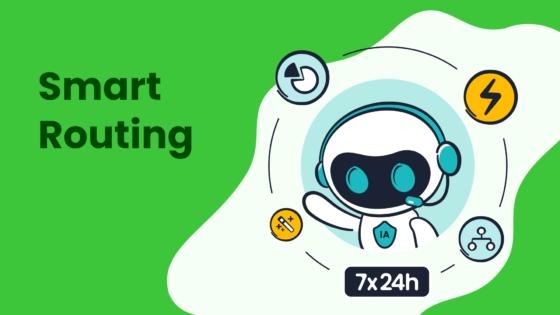
In 2025, AI calling systems redefine customer service and call center operations. You witness a shift where businesses increasingly rely on AI to elevate communication efficiency and improve customer satisfaction. This trend is backed by compelling statistics:
- 72% of business leaders believe AI surpasses human performance in customer service.
- The chatbot market is set to grow by $1.43 billion in 2025, showcasing rapid adoption.
- Gartner predicts conversational AI will cut contact center labor costs by $80 billion by 2026.
Companies like Sobot lead this transformation by integrating AI-powered solutions that streamline interactions and offer real-time insights. With AI, you experience faster resolutions and personalized support, reshaping how businesses connect with their customers.
Understanding AI Calling Systems
What Is an AI Calling System?
An AI calling system is a technology-driven solution that automates and enhances phone-based communication. It uses artificial intelligence to handle tasks like answering calls, routing inquiries, and providing real-time assistance. Unlike traditional systems, AI callings rely on advanced algorithms to understand and respond to customer needs. These systems can simulate human-like interactions, making conversations more natural and efficient.

For example, Sobot's AI-powered Voice/Call Center offers features like intelligent IVR, AI voicebots, and real-time analytics. These tools allow businesses to streamline their communication processes while maintaining high levels of customer satisfaction. With AI answering services, you can ensure faster resolutions and personalized support, even during peak hours.
The Purpose of AI Calling Systems in Modern Communication
AI calling systems play a crucial role in modern communication by addressing the growing demand for efficiency and personalization. Businesses use these systems to handle high call volumes, reduce wait times, and improve customer experiences. AI answering services also enable companies to operate 24/7, ensuring that no customer query goes unanswered.
Here are some ways AI enhances communication strategies:
- AI-driven chatbots and voice assistants improve response times and customer satisfaction.
- AI-powered analytics help identify communication patterns, leading to better strategies.
- Multilingual capabilities overcome language barriers, enabling global outreach.
- Real-time grammar and style corrections ensure clear and professional communication.
Companies like IBM and American Express have successfully implemented AI call answering services. IBM reduced call handling time by 30%, while American Express achieved a 25% increase in customer satisfaction. These examples highlight the transformative impact of AI on communication.
Key Technologies Powering AI Calling Systems
AI calling systems rely on several advanced technologies to deliver seamless and efficient communication. These include:
- Chatbots: AI-based agents that handle customer inquiries through text or voice, offering instant responses.
- Voice Recognition: Enables systems to understand spoken language and identify customer intents.
- Natural Language Processing (NLP): Allows machines to interpret and respond to human language, ensuring accurate and context-aware interactions.
- Predictive Analytics: Analyzes historical data to forecast customer behavior, optimizing staffing and marketing strategies.
- Automated Call Distribution (ACD): Routes calls to the most suitable agents based on skills and customer needs.
Sobot's Voice/Call Center integrates these technologies to provide industry-specific solutions. For instance, its AI-powered voicebot uses NLP and voice recognition to deliver human-like interactions. The platform also supports seamless integration with CRM systems, ensuring a unified workspace for agents. By leveraging these technologies, you can enhance operational efficiency and customer satisfaction.
Features That Define AI Calling Systems in 2025
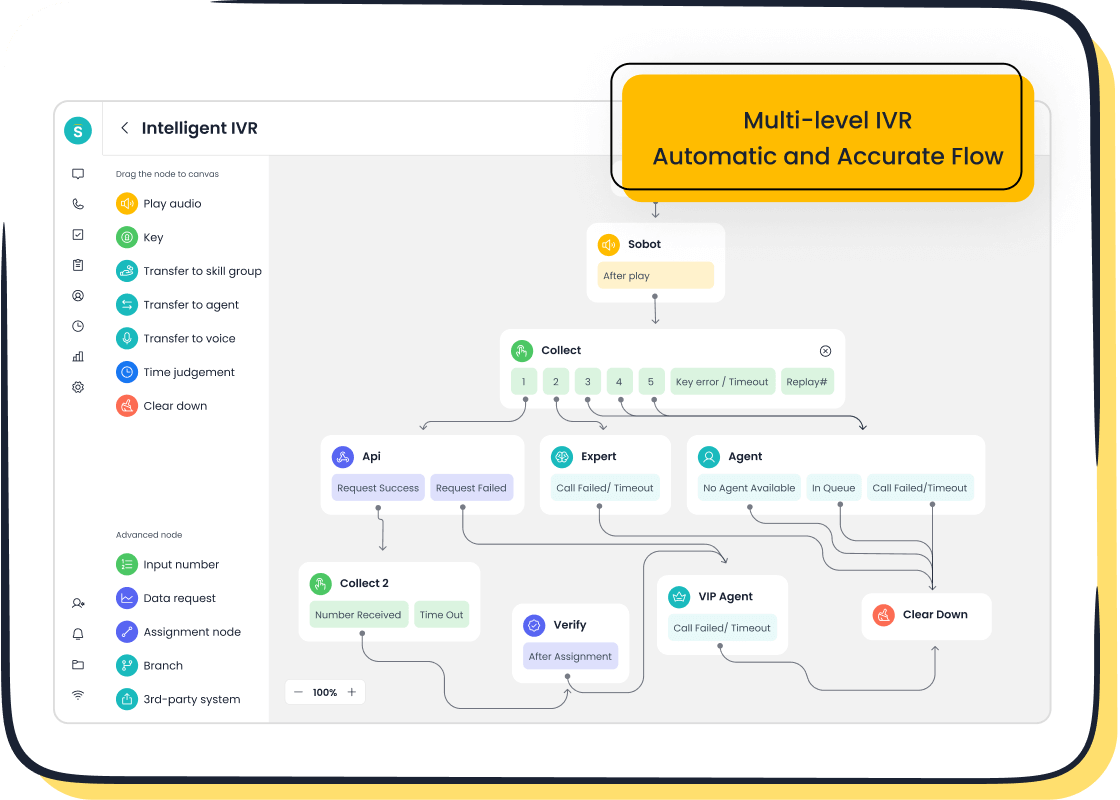
Advanced Conversational AI and AI Answering Services
AI answering services in 2025 redefine customer interactions with smarter voice automation and customizable agents. These systems use advanced conversational AI to simulate human-like conversations, ensuring seamless communication. For example, sentiment analysis detects a caller’s emotional state, enabling empathetic responses. Personalization engines tailor interactions based on customer history, creating a unique experience for every caller.
Sobot’s AI-powered Voice/Call Center exemplifies these advancements. Its AI receptionist uses adaptive learning algorithms to improve over time, delivering industry-specific solutions for retail, finance, and gaming. With features like text-to-speech technology and voice biometrics, Sobot ensures secure and natural-sounding interactions. Businesses benefit from 24/7 support, reducing call handling time and enhancing customer satisfaction.
Statistics highlight the impact of conversational AI. Dasha Voice AI reduces call handling time by autonomously managing common queries, while its 24/7 availability boosts customer satisfaction scores. These metrics demonstrate how AI-driven voice automation transforms call management into a streamlined, efficient process.
Integration with CRM and Business Tools
Business integrations are a cornerstone of AI calling systems in 2025. These systems seamlessly connect with CRM platforms and other business tools, enabling unified workflows and real-time call analytics. For instance, CRM integration allows agents to access customer history instantly, eliminating repetitive questions and enhancing service quality. Calendar integration automates appointment scheduling, saving time for both businesses and customers.
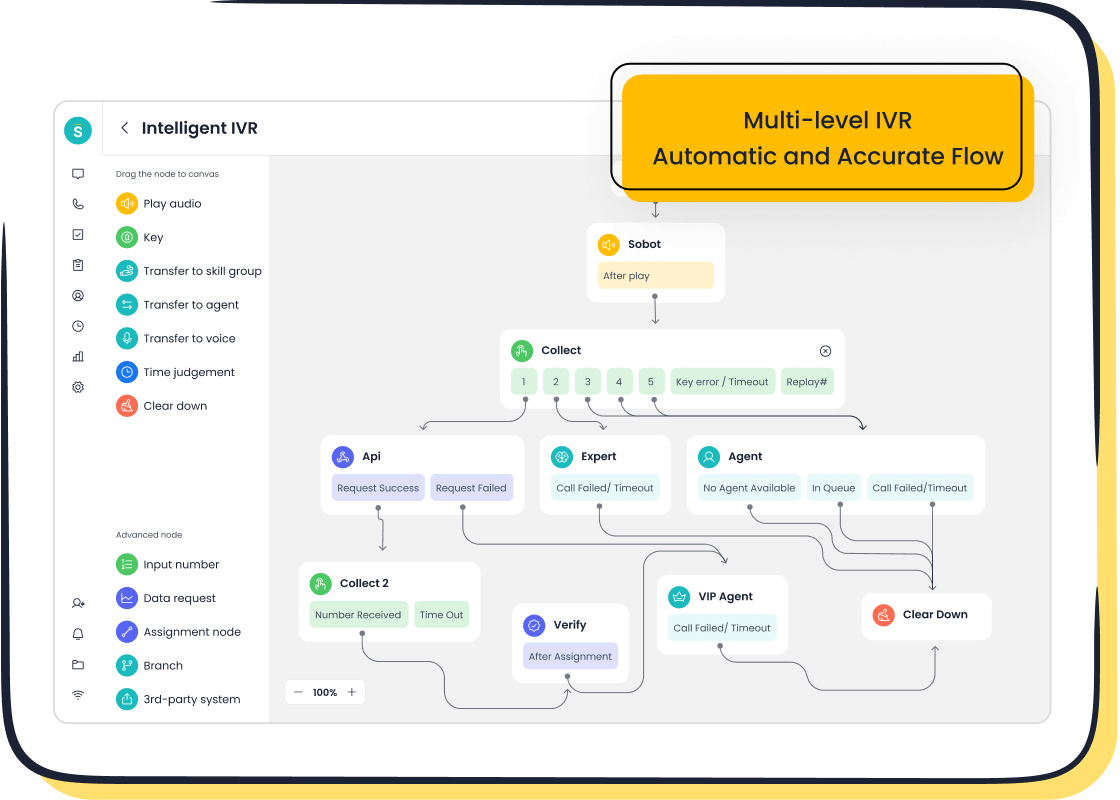
Sobot’s Voice/Call Center excels in this area. Its customizable agents work within a unified workspace, integrating with CRM systems to provide personalized service. The platform supports automated appointment scheduling and workflow automation, ensuring smooth operations. With global telephony contacts and multilingual capabilities, Sobot delivers industry-specific solutions that cater to diverse customer bases.
Metrics validate the effectiveness of these integrations. Efficiency metrics assess how AI technologies streamline operations, while financial impact metrics quantify the economic benefits. For example, businesses using integrated AI call answering services report significant reductions in labor costs and improved deal sizes during calls.
Real-Time Analytics and Reporting
Real-time call analytics empower businesses to make data-driven decisions. AI calling systems in 2025 provide detailed insights into customer sentiment, agent performance, and call duration. Sentiment scores measure emotional intensity, helping businesses understand customer satisfaction levels. InstaScore evaluates agent performance against predefined criteria, ensuring consistent service quality.
Sobot’s Voice/Call Center leverages real-time analytics to optimize call management. Its monitoring tools track call duration and sentiment, offering actionable insights for improvement. The platform’s adaptive learning algorithms refine performance based on interaction outcomes, ensuring continuous enhancement.
Proactive service delivery is another key feature. AI anticipates customer needs using behavioral patterns, enabling hyper-personalized interactions. For example, Sobot’s AI-driven voice automation predicts customer preferences, delivering tailored solutions that boost satisfaction and loyalty.
These features not only improve operational efficiency but also enhance customer experiences. Businesses gain a competitive edge by leveraging real-time analytics to refine strategies and deliver exceptional service.
Multilingual and Cross-Cultural Communication
In 2025, businesses operate in a global marketplace where customers speak different languages and come from diverse cultural backgrounds. AI calling systems address this challenge by offering multilingual capabilities and cross-cultural adaptability. These features allow you to connect with customers worldwide, ensuring clear communication and personalized service.

AI answering services now support multiple languages, enabling businesses to overcome language barriers. For example, Sobot’s Voice/Call Center provides multilingual support, allowing agents to communicate fluently with customers in their native languages. This feature ensures that every customer feels understood and valued, regardless of their location or language preference.
Cultural nuances also play a significant role in communication. AI callings in 2025 incorporate cultural sensitivity into their design. These systems adapt their tone, phrasing, and even humor to align with the cultural expectations of the caller. For instance, an AI answering service might use formal language for a Japanese customer while adopting a more casual tone for an American caller. This adaptability enhances customer satisfaction and builds trust.
Real-time translation is another game-changing feature. AI-powered voicebots can instantly translate conversations, enabling seamless communication between agents and customers who speak different languages. This capability is particularly valuable for industries like travel, retail, and e-commerce, where businesses interact with a diverse customer base daily.
By integrating multilingual and culturally adaptive features, AI calling systems empower you to expand your reach and provide exceptional service to a global audience. These advancements not only improve customer experiences but also give your business a competitive edge in the international market.
Security and Privacy Enhancements
As AI callings become more advanced, ensuring data security and compliance has become a top priority. In 2025, AI answering services incorporate enterprise-grade security measures to protect sensitive information and maintain customer trust. These systems are designed to safeguard data while delivering efficient and personalized service.
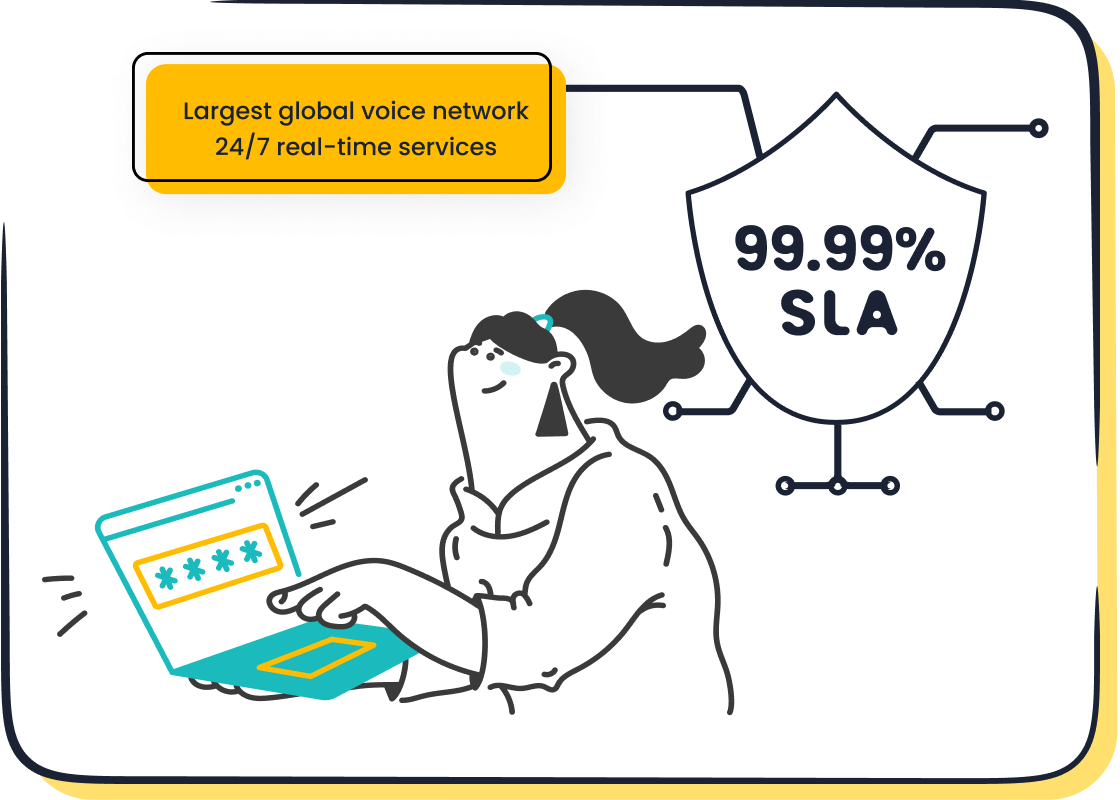
AI-powered technologies now include features like encrypted data transfer and secure storage. For example, Sobot’s Voice/Call Center ensures that all customer interactions are encrypted, preventing unauthorized access. This level of security is crucial for industries like finance and healthcare, where protecting sensitive information is non-negotiable.
Privacy enhancements have also evolved significantly. AI systems now anonymize personal data to comply with privacy regulations. For instance, hospitals use AI to blur patient details in video feeds, ensuring that sensitive information remains protected. Retail businesses analyze customer behavior without storing personal information, allowing them to gather insights while respecting privacy.
AI answering services also include advanced authentication methods like voice biometrics. This technology verifies a caller’s identity based on their unique voice patterns, adding an extra layer of security. By using voice biometrics, you can prevent fraud and ensure that only authorized individuals access sensitive information.
Real-time monitoring and alerts further enhance security. AI systems detect unusual activity during calls, such as attempts to extract sensitive information, and immediately notify administrators. This proactive approach helps you address potential threats before they escalate.
With these enterprise-grade security measures, AI calling systems provide a safe and reliable platform for communication. They enable you to focus on delivering excellent service while ensuring that customer data remains secure and compliant with regulations.
Evaluating Usability and Performance
AI Calling Systems in Customer Service Centers
AI calling systems have revolutionized customer service centers by enhancing efficiency and improving customer interactions. These systems handle routine inquiries, freeing agents to focus on complex issues. For example, a telecommunications company resolved 80% of routine inquiries using AI, boosting customer satisfaction by 30%. Similarly, a global bank automated its call center operations, achieving a 25% increase in service levels.
AI answering services also optimize operations by balancing priorities like response times and problem resolution. Research from Binghamton University highlights how AI improves flexibility, enabling businesses to adapt to changing demands. Predictive analytics further enhance customer experience by anticipating needs and tailoring responses.

Sobot’s AI receptionist exemplifies these advancements. It uses adaptive learning to refine performance, ensuring seamless customer interactions. With features like intelligent IVR and multilingual support, Sobot’s solutions cater to diverse industries, including retail and finance. These tools empower you to deliver consistent, high-quality service while reducing operational costs.
Real-World Performance in High-Volume Call Environments
High-volume call environments demand robust systems that maintain efficiency without compromising quality. AI callings excel in these scenarios by leveraging performance metrics to optimize operations. Key metrics include:
- First Call Resolution: Measures the percentage of calls resolved on the first attempt, reflecting efficiency.
- Average Handle Time: Tracks call duration, balancing speed with service quality.
- Customer Satisfaction Score: Gauges satisfaction through post-call surveys.
- Net Promoter Score: Evaluates customer loyalty and likelihood to recommend the service.

Sobot’s AI-powered Voice/Call Center demonstrates real-world effectiveness. Its AI answering services reduce call abandonment rates and improve average speed of answer, ensuring a positive customer experience. By analyzing call data in real time, Sobot helps businesses refine strategies and enhance agent performance.
User Experience: Customer and Agent Perspectives
AI calling systems transform user experiences for both customers and agents. Customers benefit from faster resolutions and personalized interactions. For instance, AI answering services predict customer preferences, delivering tailored solutions that boost satisfaction. Multilingual capabilities ensure clear communication, regardless of language barriers.
Agents also experience significant improvements. Surveys reveal that companies using generative AI report lower agent overwhelm rates—53% compared to 81% at companies without AI. Service innovators are 4.6 times more likely to achieve excellent customer satisfaction and 2.5 times more likely to report high employee satisfaction.
Sobot’s AI receptionist enhances agent productivity by automating repetitive tasks and providing real-time insights. Its unified workspace integrates customer data, enabling agents to deliver efficient and personalized service. These features create a balanced environment where both customers and agents thrive.
Sobot Voice/Call Center: A Case Study of Excellence
Sobot Voice/Call Center stands out as a benchmark for excellence in AI calling systems. Its innovative features and proven results demonstrate how AI answering services can transform customer service operations. By leveraging advanced technologies like intelligent IVR, AI-powered voicebots, and real-time analytics, Sobot delivers exceptional outcomes for businesses across industries.
The platform’s impact becomes evident when you examine its performance metrics. Sobot Voice/Call Center achieves remarkable results in key areas of customer service:
| Metric/Outcome | Result |
|---|---|
| Reduction in inbound discussion volume | 20% |
| Increase in positive feedback | 96%+ |
| Correct answers provided by AI platform | Over 80% |
| Customer satisfaction rate | Over 95% |
| Self-service question resolution | 22.2% |
| Customer satisfaction score (CSAT) | 97% |
| Problem resolution rate | 85% |
| Customer happiness rate | 99% |
| Sign-off rate increase | About 35% |
| COD collection rate increase | About 40% |
These figures highlight how Sobot’s AI answering services enhance efficiency and customer satisfaction. For instance, the platform reduces inbound discussion volume by 20%, allowing agents to focus on complex issues. Its AI-powered voicebots resolve over 22% of inquiries through self-service, improving response times and reducing operational costs.
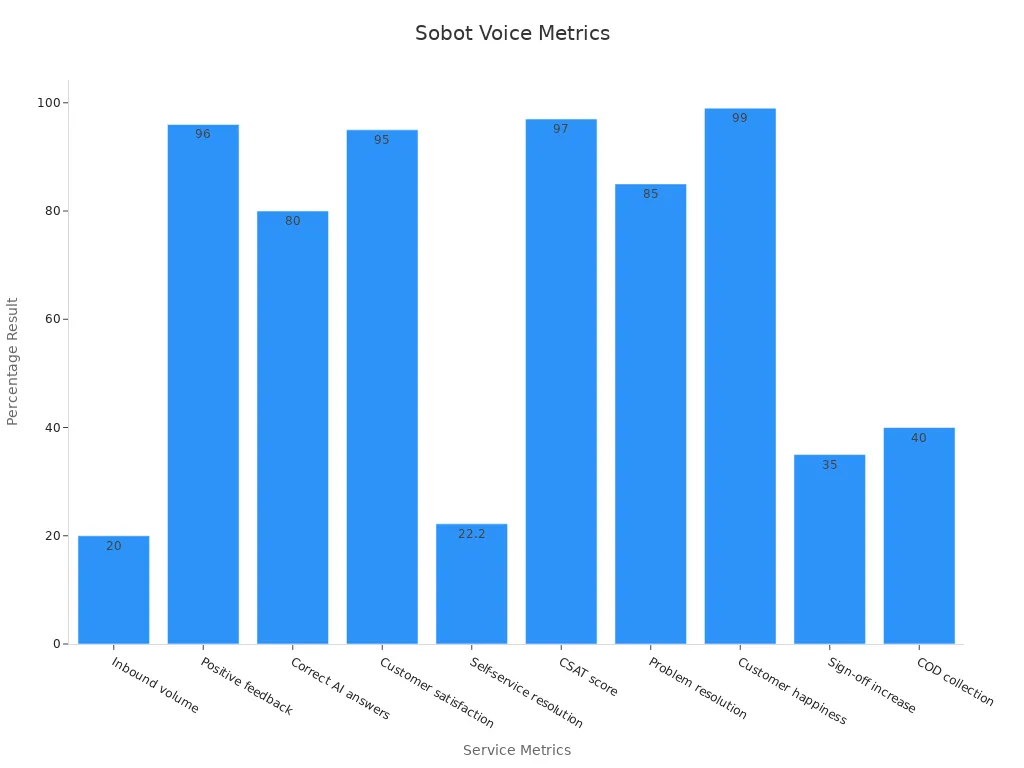
Sobot Voice/Call Center also excels in personalization. Its AI answering services analyze customer data to deliver tailored solutions, boosting happiness rates to an impressive 99%. The platform’s multilingual capabilities and seamless CRM integration ensure consistent service quality across diverse customer bases.
By adopting Sobot Voice/Call Center, you can achieve similar results. Its cutting-edge AI calling systems redefine customer interactions, setting a new standard for excellence in the industry.
Pros and Cons of AI Calling Systems
Advantages: Efficiency, Scalability, and Cost Savings
AI calling systems offer unmatched efficiency, scalability, and cost savings. These systems automate routine tasks, allowing you to focus on more complex challenges. For instance, AI answering services reduce call handling times and improve first-contact resolution rates. This leads to faster problem-solving and higher customer satisfaction.
Scalability is another key advantage. AI systems handle high call volumes without compromising quality. Whether your business manages hundreds or thousands of calls daily, AI adapts to your needs seamlessly. Cost savings also become evident as AI reduces the need for large customer service teams. By automating repetitive tasks, you can allocate resources more effectively.
The following table highlights the quantitative impact of AI on operational metrics:
| Metric | Definition | AI Impact | Example |
|---|---|---|---|
| Mean Time to Resolution (MTTR) | Average time taken to resolve IT issues | Reduces MTTR by 30-50% | Reduced from 4 hours to 2.5 hours |
| First Contact Resolution Rate | Percentage of issues resolved on first contact | Improves FCR by 15-30% | Increased from 65% to 82% |
| IT Operations Cost per User | Total IT operational costs divided by users | Reduces this metric by 20-40% | Dropped from $2000 to $1400 annually |
These figures demonstrate how AI answering services enhance efficiency and reduce costs, making them a valuable asset for businesses.
Challenges: Complex Conversations and Ethical Concerns
Despite its advantages, AI faces challenges in handling complex conversations and ethical concerns. AI answering services excel at routine tasks but struggle with nuanced interactions. For example, understanding sarcasm or resolving emotionally charged issues often requires human empathy.
Ethical concerns also arise with AI adoption. Data privacy and security remain critical issues. Customers expect their information to stay protected, yet breaches can occur if systems lack robust safeguards. Additionally, over-reliance on AI may lead to job displacement, raising questions about the social impact of automation.
Addressing these challenges requires a balanced approach. Businesses must ensure that AI systems comply with data protection regulations and maintain transparency in their operations. Combining AI with human oversight can mitigate risks and enhance trust.
Balancing Automation with Human Interaction
The ideal customer service model integrates AI for efficiency and human agents for empathy. AI handles routine inquiries, freeing agents to focus on complex issues. For instance, Bank of America's virtual assistant, Erica, manages over 2 million interactions daily, allowing human agents to address more nuanced customer needs.
"A blended AI approach where automation can help the human be more human is most ideal," says Graeme Provan, global director of business automation at Genesys.
This balance ensures that customers receive personalized service while benefiting from the speed and accuracy of AI. By combining automation with human interaction, you can create a customer experience that is both efficient and empathetic.
Who Benefits Most from AI Calling Systems?

Industries Leveraging AI Calling Systems
AI calling systems have transformed industries by improving communication and streamlining operations. Retail and e-commerce businesses use AI to handle customer inquiries, manage returns, and provide personalized shopping experiences. Financial services rely on AI for secure transactions and fraud detection during calls. Gaming companies enhance player support with AI-powered voicebots that resolve issues quickly.
Healthcare providers benefit from AI answering services that schedule appointments and share test results securely. Education institutions use AI to assist students with enrollment and course selection. Manufacturing companies optimize supply chain communication with AI-driven call routing. Across these industries, AI helps you deliver faster resolutions and better customer experiences.
Small Businesses vs. Large Enterprises
AI calling systems cater to businesses of all sizes, but their impact varies. As a small business owner, you can use AI to reduce costs and improve efficiency. AI answering services handle routine calls, freeing your team to focus on growth. For example, AI can automate lead qualification & sales, helping you identify potential customers without hiring additional staff.
Large enterprises benefit from AI’s scalability. If you manage a global company, AI systems handle high call volumes across multiple regions. Features like multilingual support and CRM integration ensure consistent service quality. AI-powered analytics help you refine strategies and improve customer satisfaction. Whether you run a startup or a multinational corporation, AI adapts to your needs.
Use Cases: Sales, Support, and Beyond
AI calling systems excel in diverse scenarios. In sales, AI automates lead qualification & sales, identifying prospects and scheduling follow-ups. AI voicebots engage customers with product recommendations, boosting conversion rates. In customer support, AI resolves inquiries 24/7, reducing wait times and improving satisfaction.
Beyond sales and support, AI enhances internal operations. You can use AI to train employees with simulated calls or analyze team performance with real-time metrics. AI also supports outbound marketing campaigns, helping you reach more customers efficiently. These use cases demonstrate AI’s versatility in driving business success.
Future Trends in AI Calling Systems
The future of AI calling systems promises exciting advancements that will redefine how you interact with businesses. These trends focus on improving efficiency, personalization, and accessibility, ensuring that communication becomes more seamless and impactful.
-
Hyper-Personalization
AI calling systems will use advanced data analytics to deliver hyper-personalized experiences. By analyzing customer behavior and preferences, these systems will predict your needs and provide tailored solutions. For example, an AI-powered voicebot might recommend products based on your purchase history, making every interaction feel unique. -
Emotion Recognition Technology
Future AI systems will incorporate emotion recognition to understand your mood during calls. This technology will analyze voice tone and speech patterns to detect emotions like frustration or happiness. Businesses can then adjust their responses to provide empathetic and effective support. -
Voice Commerce Integration
Voice commerce will become a significant trend. AI calling systems will enable you to complete purchases, track orders, or even make payments through voice commands. This feature will simplify transactions and enhance convenience. -
Proactive Customer Support
AI will shift from reactive to proactive support. Systems will anticipate your issues before you even reach out. For instance, if a product delivery is delayed, the AI might notify you and offer solutions without requiring your input.
Tip: Businesses adopting these trends early will gain a competitive edge by delivering exceptional customer experiences.
These advancements will make AI calling systems indispensable for businesses and customers alike. As these technologies evolve, you can expect faster, smarter, and more empathetic interactions.
AI calling systems in 2025 redefine communication with features like conversational engines, real-time analytics, and multilingual capabilities. These systems enhance efficiency, automate routine tasks, and deliver personalized experiences. For example, automated appointment scheduling reduces human workload, while CRM integrations streamline workflows.
Sobot’s Voice/Call Center exemplifies these advancements. Its AI-powered solutions improve customer satisfaction and operational efficiency, making it ideal for high-volume environments. With features like intelligent IVR and global telephony support, Sobot empowers businesses to deliver exceptional service.
Looking ahead, AI continues to evolve. Companies like IBM and Nokia drive innovation through partnerships and AI-native platforms. Future trends include emotion recognition, voice commerce, and proactive support, ensuring smarter and more empathetic interactions. By adopting AI calling systems, you stay ahead in delivering seamless communication experiences.
FAQ
What industries benefit the most from AI calling systems?
AI calling systems transform industries like retail, finance, healthcare, and gaming. For example, Sobot’s Voice/Call Center helps retail businesses handle multilingual customer inquiries and financial institutions secure transactions. These systems improve efficiency and customer satisfaction across diverse sectors.
How do AI answering services improve customer service?
AI answering services automate routine tasks, reducing wait times and improving first-call resolution rates. Sobot’s AI-powered Voice/Call Center uses intelligent IVR and real-time analytics to deliver faster, personalized support. This ensures higher customer satisfaction and operational efficiency.
Are AI calling systems secure?
Yes, modern AI calling systems prioritize security. Sobot’s Voice/Call Center ensures encrypted data transfer and voice biometrics for authentication. These features protect sensitive information, making the platform ideal for industries like finance and healthcare.
Can small businesses afford AI calling systems?
AI calling systems like Sobot’s Voice/Call Center operate on a cost-effective SaaS model. This makes them accessible to small businesses. Features like batch outbound calling and automated workflows help reduce operational costs while improving efficiency.
How do AI calling systems handle multilingual communication?
AI calling systems use advanced NLP and real-time translation to support multiple languages. Sobot’s Voice/Call Center offers multilingual capabilities, enabling businesses to serve global customers effectively. This feature ensures clear communication and builds trust across diverse audiences.
See Also
Best Voice Calling Automation Tools Evaluated for 2024
Evaluating AI Solutions for Enterprise Call Centers
Best Analytics Software for Call Centers in 2024
